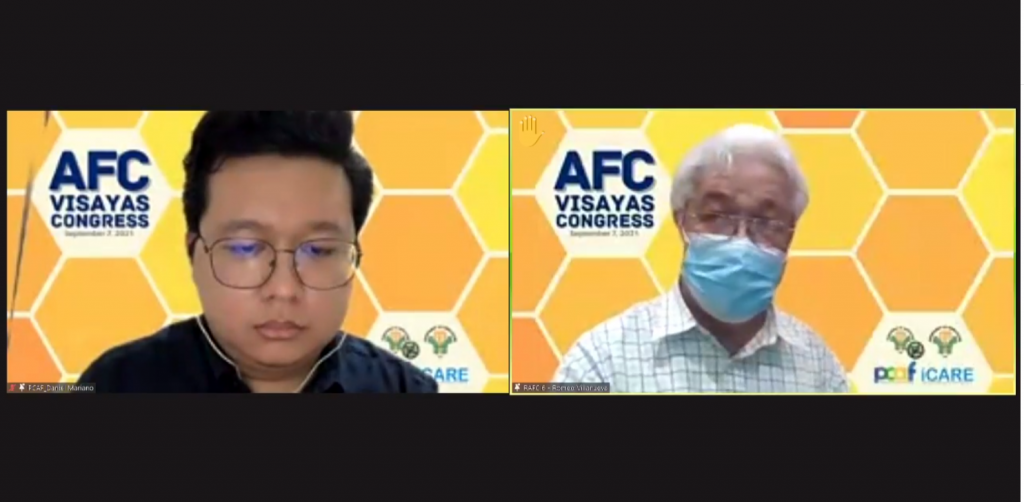
Agricultural and Fishery Councils (AFCs) from Visayas regions, together with the Department of Agriculture (DA) officials and the Philippine Council for Agriculture and Fisheries, (PCAF) had their 4th AFC Visayas Congress on September 7, 2021, through a blended approach.
The event is an information-sharing platform for the AFCs where they can engage in meaningful discussions on local agriculture and fisheries concerns and development in their respective areas. The Congress is also a venue for the AFCs to come up with collaborative actions and decisions on how to address these issues and concerns. “AFC Volunteers, Our Modern Day Heroes: Stronghold of Resilience and Overcoming Defeat Amidst the Covid-19 Global Pandemic” is the theme of the two-day event.
PCAF OIC Executive Director Liza Battad lauded the efforts of the AFCs amidst the pandemic.
“Frontliner now has a broader scope. Our farmers and fishers who produce food are also considered frontliners. Our AFCs, you are the pillars of PCAF,” she added.
For the morning session, Visayas Chairperson Elma Peña discussed the rationale and objectives of the activity which was shortly followed by a lecture by Dr. Gerry Avilla- Chief of Field Operations Division of DA Regional Field Office VII on the effects of the World Trade Organization on Philippine Agriculture. Dr. Avilla said that importing is a balancing process as restrictive policies can benefit local producers but hurt domestic consumers due to higher prices, smaller supply, and inhibit trade.
Dr. Avilla also discussed Economic Integration where nations reduce or eliminate trade barriers and coordination of fiscal and monetary policies.
Also part of the morning session is Ms. Alicia Ilaga from DA-Climate Resilient Agriculture Office’s lecture on Inclusive Livelihood Program for Climate Smart Agriculture for Farmers and fisherfolk. She said that farmers and fisherfolks can adapt to climate change and that they must be considered in policy and decision making processes. She also emphasized that climate hazards account for 99.9% of losses or damages in agriculture.
“Techniques such as typhoon risk calendars can be used by farmers to plant on the right time where there are less typhoon hazards thus, reducing expected losses,” She added.
For the afternoon session, Dr. Janice Garcia from the Bureau of Animal Industry (BAI) discussed ASF Crisis: An Opportunity to Modernize the Swine Industry where she said that backyard farms are vital source African Swine Fever (ASF) and is spread by trading of infected hogs, use of ASF tended pork for processing, swill feeding, lack of commitment from Local Government Units (LGU’s)
On the other hand, she emphasized that the massive swine depopulation brought about by ASF can be used as an advantage to repopulate the Philippine swine population with better hog breeds.
It was followed by a presentation of Mr. Buen Mondejar- Chairperson on the Committee on Poultry, Livestock, and Corn on RAFC Western Visayas on the Visayas Situationer on Prime Agricultural Commodities Amidst the Pandemic where the physical area, number of palay farmers, and average palay farm size of the Visayas Cluster was presented.
According to the report, as of July 2021, Visayas Cluster contributed to 2,552, 948 heads of hogs where 83% comes from backyard and 17% from commercial raisers.
For the poultry sector, the Visayas Region has a 69,443.20 Metric Tons production volume for the second quarter of 2021.
During the breakout session, the participants proposed resolutions based on the topics presented. The Western Visayas group suggested actions and resolutions on the establishment of the Agricultural Information System (AIS), import regulation on agricultural commodities, the dwindling number of farm laborers due to 4Ps, organic agriculture, burning of agricultural wastes, biosecurity action plan, value-adding on pork, local production of alternative sources of protein to lower the commercial feed costs, address the low buying costs of palay and oversupply/wastage of agricultural commodities, loss of livelihood due to closed fishing season, reducing the effects of climate change, support from Local Government Units (LGU’s) on Agricultural Marketing Development Program, loan collections being returned to national treasury, and direct cash assistance to farmers tilling less than 2 ha/s of rice farm.
The Central Visayas group recommended establishing solar-powered ice plants in key areas to prevent spoilage of agricultural commodities, the revival of salt-making livelihood program, easy access loans for seaweed farmers, research and development funds to improve the seaweed varieties, urban gardening, upgrading of the existing auction markets in Central Visayas, adoption of F2C2 concept in swine farms, intensification of biosecurity measures in the area, and regulating the use of double-body fishing vessels.
For the Eastern Visayas, they recommended for the extension of the implementation of indemnification fund/program for the affected hog farmers and raisers, simplification of the documentary requirements for loan availment, subsidy on hog feeds, inclusion of ASF fund for Provincial LGU’s annual budget, establishment of additional storage facilities for agricultural commodities, prioritization of agricultural workers on COVID-19 vaccine, additional funding for the Eastern Visayas Agricultural Research Center (EVIARC) to strengthen the jackfruit production, and the adoption of climate-resilient plans and capacitate individual farmers.
The Visayas Cluster composed of Regions 6, 7, and 8 participants agreed and moved for the approval of all the resolutions and recommendations presented during the event.
In her closing remarks, PCAF Partnership Development Division OIC Chief Floreliz Avellana delivered the message on behalf of PCAF Deputy Executive Director Julieta Opulencia assured the participants that PCAF will do its part in making sure that the recommendations and resolutions will reach the concerned agencies and offices and reassured the AFCs that PCAF will continue to be their partner in pursuing their goals towards the betterment of the Philippine agri-fishery sector. | CCB











